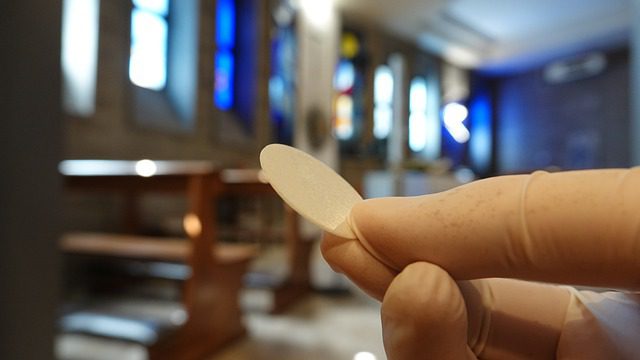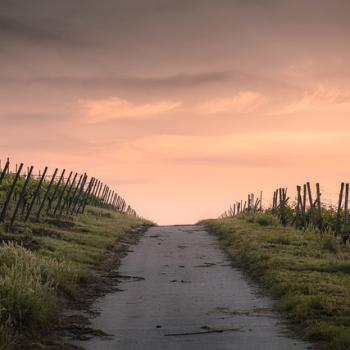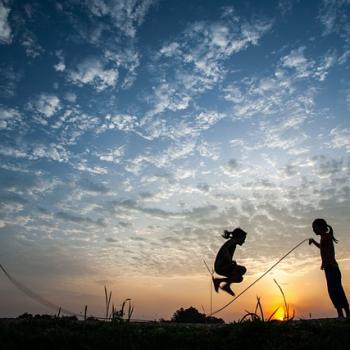
Today is the Feast of Corpus Christi.
I always thought that was a terrible word: “corpus.” When I was little, hearing “Corpus Christi” made me think of skeletons and Halloween.
“Do you know what ‘Corpus Christi’ means?” I asked my daughter last night. Rosie shook her head. “Well, what does ‘corpse’ mean? You know that. If I said ‘there’s a corpse in the backyard,’ what would I be talking about?”
Rosie smiled with recognition. She watches nature documentaries all day long. She’s already decided that she wants to be a park ranger when she grows up, and I told her it will require a bachelor’s degree in science. Science is her passion. She knows what a corpse is. “A body. A dead body of a person or an animal.”
“Right,” I said. “‘Corpus’ is a Latin word, and it means ‘body.’ ‘Corpus Christi’ is the day we celebrate the Body of Christ.”
Rosie has learned a lot about corpses lately, watching all those nature shows. She could tell you that corpses are made of meat, and in one way or another, they’re eaten. Sometimes you bury them nicely in the ground, and they’re eaten by fungus and bacteria until they return to the soil, but often it’s not that picturesque. A leopard, for example, will drag the corpse of a nice fresh impala up a tree with him, to protect it from other apex predators who want a free meal. Foxes will drag a wounded animal that’s not quite a corpse yet back to the den for the kits to play with, so they’ll learn how to hunt. Lions and hyaenas fight over corpses– and despite what you might have heard, lions steal the corpse hyaenas hunted as often as the reverse is true. A group of Tasmanian devils will devour a corpse, bones and all, in a few hours, and they don’t care how long it’s been rotting first.
If there’s a nice shallow pond in the woods, that pond will eventually fill up with decaying remains of all the plants and animals that used to be alive in there, until it gets shallower and shallower and then it’s just a nice rich loam which trees and wildflowers grow out of. So, if you go for a walk in the woods to admire all the wildlife there, chances are you are walking on corpses.
And that’s just the animals.
Humans have done some distasteful things with corpses. Rosie doesn’t know too much about that yet, but most grown-ups can name a few incidents from the history books. The Nazis burned corpses to ashes, and were rumored to also use them to make soap. Joan of Arc’s corpse was burned until there was nothing left except her heart, and the heart was thrown in the river. In American lynchings, the murderers sometimes took bits of the corpse home for souvenirs and sometimes left it swinging from the tree as a warning to future victims. In the Middle Ages, heads and whole bodies of execution victims were displayed on castles as a warning to those considering treachery. Crucified corpses were sometimes left rotting in the sun as a reminder to the people the ancient Romans terrorized.
Corpses are everywhere, but we don’t like to think of them because they scare us. A corpse is an ugly thing, a thing that is used and squabbled over and eaten, a thing that the powerful use and exploit in the ugliest ways as a reminder to the people whom they have the power to make into corpses.
A corpus, a body, is something that is doomed to become a corpse, one way or another.
Our God, without change or losing any of what He Is, chose voluntarily to become a human with a corpus– and, eventually, a corpse.
We’re told that this world was perfect once upon a time, and then, through sin, it fell. And something that was supposed to be all life and abundance became all death and competition. A thing that was supposed to go on for infinity in beauty became a different thing, a thing full of corpses. And God remained with us, everywhere present and filling all things, so even in the dark and fallen world full of corpses there is beauty and mystery and adventure worth living. But He went further still. He had always planned to come and dwell among us, not only present in creation invisibly but physically present as a human with a corpus. Since the world was fallen and all of us His beloved were doomed to die, He took it a step further and decided that He, too, would accept death and become a corpse. He would become a poor member of an oppressed race in an occupied country, a person to be preyed on by the powerful and the important, and allow them to do what they had always done to people like Him. He would be preyed on by human predators, torn apart, hung up alive and then left a dead corpse until nightfall, and put under the ground.
Before He did that, though, He gave us a sign and more than a sign. On the night before He suffered, He took bread in His sacred hands, broke the bread, gave it to His disciples and said, “Take this, all of you, and eat it, for this is my Corpus.” And the bread became the Body, Blood, Soul and Divinity, the whole of Christ. And everyone who eats that Corpus becomes something more than they were before. They begin to be taken up into the Life of the Holy Trinity, which is eternal and cannot be stopped by death.
And then He died, so that death itself and the dreadful mystery of becoming a corpse would be taken up into the Life of the Holy Trinity. And then He descended into hell and broke the bars of death, and the souls of the righteous rose from their graves and appeared to many. He was laid in the tomb as some corpses are. And then He rose from the dead so that that which had been a corpse became once again a living corpus, a living Body, and appeared to His disciples, and ascended back into Heaven so that a human Body now sits on the throne of God. All of this we know by Faith.
And we believe that the Blessed Sacrament, the Body and Blood of Christ, will bring us to Everlasting Life.
The terrible, wonderful, frightening, glorious and mysterious meaning of Corpus Christi is that when we receive Christ’s Body and Blood, we do not eat a corpse. We receive the whole of Someone Who is alive. We do this in remembrance of His death and resurrection, and of the promise that He will come again. He will raise us from the dead, so that we will no longer be corpses. That day is coming soon.
Soul of Christ, be my sanctification;
Body of Christ, be my salvation;
Blood of Christ, fill all my veins;
Water of Christ’s side, wash out my stains;
Passion of Christ, my comfort be;
O good Jesus, listen to me;
In Thy wounds I fain would hide;
Ne’er to be parted from Thy side;
Guard me, should the foe assail me;
Call me when my life shall fail me;
Bid me come to Thee above,
With Thy saints to sing Thy love,
World without end.
Amen.
And that’s what Corpus Christi means. Amen.
Image via Pixabay
Mary Pezzulo is the author of Meditations on the Way of the Cross and Stumbling into Grace: How We Meet God in Tiny Works of Mercy.
Steel Magnificat operates almost entirely on tips. To tip the author, visit our donate page.













